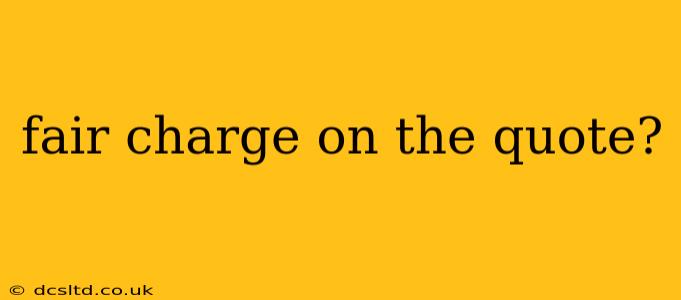Determining a Fair Charge on a Quote: A Comprehensive Guide
Getting a fair price for any service or product is crucial. A quote, whether for a home repair, a piece of custom artwork, or a complex software project, should clearly outline the cost and justify its value. But how do you determine if the charge is fair? This guide will help you navigate the process and understand what factors influence a fair quote.
What factors determine a fair price?
Many elements contribute to a fair price. Understanding these helps you evaluate the quote you've received.
-
Labor Costs: The most significant factor is often the time and expertise required. A skilled professional commands a higher rate than an entry-level worker. Consider the complexity of the job and the specialized skills involved. Does the quote adequately reflect the time investment?
-
Materials: The cost of materials used directly impacts the final price. High-quality, durable materials naturally cost more than cheaper alternatives. Check if the quote explicitly lists the materials used and their associated costs. Transparency is key.
-
Overhead: Businesses have overhead costs like rent, utilities, insurance, and administrative expenses. These costs are usually factored into the final price, though not always explicitly stated. A very low quote might indicate a lack of consideration for these essential business expenses.
-
Profit Margin: Businesses need to make a profit to remain viable. A fair quote includes a reasonable profit margin to compensate for the risks involved and ensure the business's long-term sustainability. However, an excessively high profit margin might indicate overcharging.
-
Market Value: Research similar services in your area to gauge the typical market price. Online resources, local directories, and word-of-mouth can provide valuable insights into competitive pricing. This helps you determine if the quote falls within the acceptable range.
-
Warranty or Guarantee: A reputable provider often offers a warranty or guarantee on their work. This added assurance can justify a slightly higher price compared to a provider without such protection.
How can I tell if I'm being overcharged?
Several red flags might indicate overcharging:
-
Lack of Transparency: Vague or unclear quotes should raise concerns. Request a detailed breakdown of costs, including labor, materials, and any additional fees.
-
Inconsistent Pricing: If the quote significantly differs from other quotes you've received for the same service, investigate why. There could be differences in materials, scope of work, or professional expertise.
-
High-Pressure Sales Tactics: Avoid providers who use high-pressure sales tactics to push you into accepting a quote immediately. Take your time to review the quote and compare it with other options.
-
Unrealistic Estimates: Be cautious of unrealistically low quotes. These might indicate a compromise in quality or a hidden increase in costs later on.
-
Missing Details: A complete quote should include the payment terms, deadlines, and any potential additional costs. Missing details could lead to unexpected surprises later.
What should I do if I believe a quote is unfair?
If you believe a quote is unfair, don't hesitate to:
-
Request a detailed explanation: Ask the provider to clarify any unclear items or discrepancies in the quote.
-
Seek additional quotes: Compare the quote with at least two other providers to establish a reasonable market price.
-
Negotiate: Don't be afraid to negotiate the price, especially if you've found comparable services at a lower cost.
-
Walk away: If you're uncomfortable with the price or the provider's approach, don't hesitate to walk away and find another option.
By carefully considering these factors, you can effectively evaluate any quote and determine if it represents a fair charge. Remember that a transparent and detailed quote is a crucial sign of a trustworthy provider.
